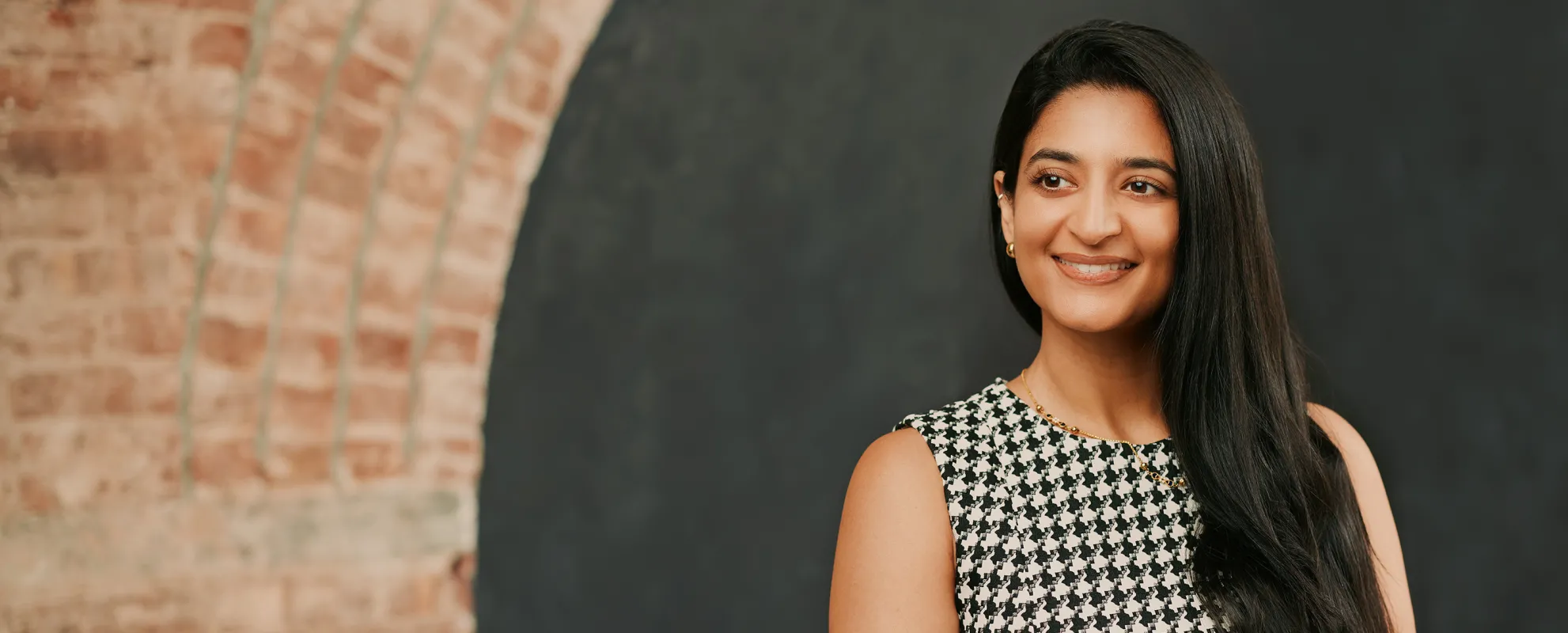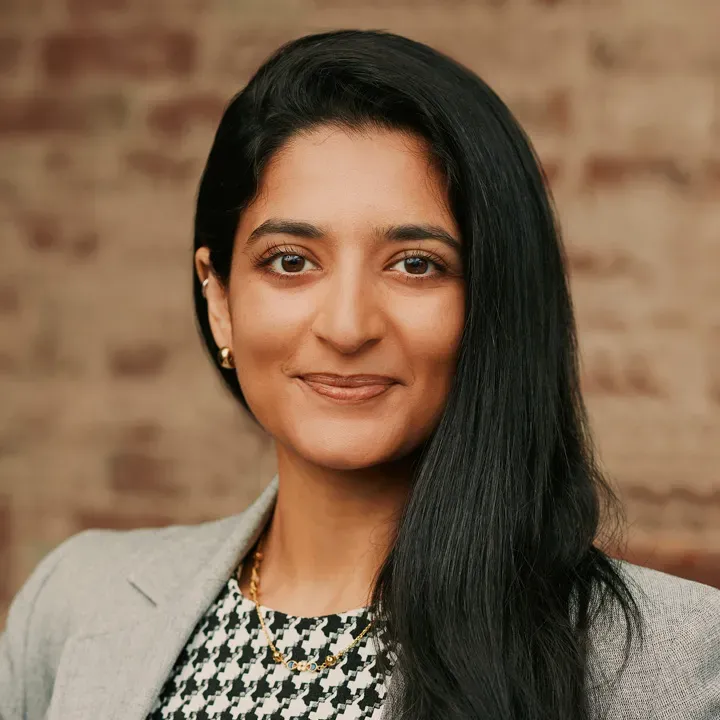As money becomes increasingly digital, global financial institutions are transforming how they serve governments, each other, and their customers. Yet, for big banks, major shifts happen slowly. Today’s banks need technology that works in tandem with their current systems and complies with regulations. And these tools must also easily integrate with future innovations.
Companies like Natalya Thakur’s are helping banks establish a payments infrastructure they can build upon as the digital payments space continues to evolve and advance. Knox Networks’ software infrastructure platform facilitates high-speed financial transactions with instant settlement between central banks, commercial banks, and consumers. Thakur co-founded the global digital payment company in 2021.
“Financial infrastructure is due for some sort of systemic change,” Thakur says. “That means whatever is next will likely solve the current most painful problems but also create a whole new set of value-added services and technical capabilities that we didn’t even know we needed.”
Although the current system “works,” Thakur notes, there is an underlying shift happening. “Sovereign assets need a way of co-existing with the ecology of digital currencies and newer regional systems, which could challenge economic and national security interests. Systemic change doesn’t happen overnight, though. These large central banks and commercial banks need the ability to work with what they have today within the current regulatory environment.”
Knox Networks helps provide that solution while also improving scalability, interoperability, and privacy in payment systems.
Thakur, a first-generation American, also wants to make an imprint that will inspire women — and especially women of color — in the finance and technology industries. “There just aren’t as many women founders and leaders in the space, and the ones that exist have to work 10 times as hard,” she says. “It’s always at the forefront of my mind and affects the work I do inside and outside of the workplace.”
You started off working in traditional finance before moving into entrepreneurship. Tell us about your career path.
As an undergrad, I took an avid interest in financial literacy. I knew I wanted to democratize access to financial resources and help rethink the future of money. That became a strong focus of mine. At BlackRock, I worked with their index investments team and digital wealth startup team. I also founded the design thinking innovation program and helped map the digital assets ecosystem for the firm at a time when the industry was relatively new. I had a passion for fintech and being an “intrapreneur.” Growing up, my family also moved a lot for work. Because I had to constantly reestablish myself, I built a resiliency that I think lent itself to entrepreneurship and thriving in ambiguous environments.
What spurred Knox Networks, and what need is it fulfilling?
The original question was, can we build a new system for the digital dollar, or any other currency, that doesn’t rely on cryptocurrency and blockchain? We’re moving away from Web3 because it’s not something large regulated institutions can easily adopt and scale right now. Their main problems revolve around scalability and instant settlement for wholesale and retail use cases, interoperability with various networks and financial standards, and privacy of data in financial transactions. We meet them where they are today and help bridge them into this digital world by solving those exact problems. Our system allows banks to protect and preserve the sovereignty and credibility of reserve currencies/assets, which are so important to overall economic stability and national security. We’ve done several pilots with large global financial institutions from the G7 and G20, and multilateral organizations.
How does the platform work?
We’ve taken the best from blockchain, such as security and auditability, and built a new technology to support the future of all regulated digital money — including central bank money, commercial bank money, electronic money, and bank-issued assets like treasuries and repurchase agreements. We use cloud-based technology that’s well understood by banks but provides a unique wrapper that allows for frictionless payments and value-added services. The best part is that it is interoperable with their current systems and potential future systems that they may use. Our software is built to be embedded and operated by the banks, which helps them from a regulatory and revenue perspective. Our insights and development are an output of our work with financial institutions, technical experts, and regulators.
What are some benefits — short- and long-term — to using a system like yours?
Our system is something that will still be operable in 20-plus years. So, banks don’t have to choose the winners now as technology rapidly changes. Our platform is also capable of longer-term effects like improving financial access for the unbanked, liquidity management for institutions, and monetary policy. We have to solve today’s problems while also building something that can address more altruistic issues.
Why come back to Stanford after BlackRock to get your MBA?
I wanted to spend time developing expertise in the digital money space and meeting all the right people who were working on developing new frontier systems for various economies and banks in the public and private sectors. I thought the GSB was a great place to round out my business toolkit and develop the right leadership skills and ability to break down any large problem into smaller pieces. With any systemic change comes the need for understanding regulation and policy, which is why I chose to do the joint degree program with the Harvard Kennedy School. From my 10-plus years in Silicon Valley, I noticed that startups never build alongside the public sector, and depending on the company’s mission, I think that’s a mistake.
You also spend a lot of time doing committee work and angel investing. How does that feed into your goals?
All the external committee work I do helps support my job. I’m still involved with the Stanford Future of Digital Currency Initiative, which I helped co-found. It’s a partnership between Stanford, the United Nations, and public–private-sector organizations. The goal is to identify challenges and opportunities around digital currencies and help develop industry standards. Through my work on the Bretton Woods Committee, I’ve learned firsthand from financial industry experts like the former head of the New York Fed, leaders of global banks, and regulators. It’s been healthy for me to have these communities to feed into my knowledge base for Knox. I started angel investing in 2018 and have enjoyed being a part of several different investing communities. It’s been rewarding to invest in my peers and connect with other founders.
Along the way, you’ve been inspired by other successful women. Who are a few?
As an undergrad I worked as a research assistant for Dr. Condoleezza Rice through the Hoover Institution. She was a big reason why I ended up pursuing the joint Stanford-Harvard degree. I was very fond of her for her work in government as a woman of color and respected diplomat, and seeing her do so well. Also, I ran the club golf team at Stanford and not only shared her passion for golf, but was in awe of her ability to continually establish herself in niche spaces where she was a minority, such as in Russian foreign policy and American sports. One of my favorite memories was watching her at the [Pebble Beach] Pro-Am. My mom is also someone who really inspires me; I’ve learned so much from her over the years. She really taught me the power of developing deep relationships and giving 110% to everything you do. As a mother, she was also very honest and straightforward with us, and learning to receive those feedback loops early and often has helped me become a better leader.
You’re also personally committed to supporting women in the field. What needs to change for women?
I’m first-generation in the U.S.; my parents are from India. I’m always thinking, I received so much, how can I pay it forward? Throughout my career, I have tried to support women, whether through my nonprofit for girls leadership, career and life coaching for women, supporting female founders through angel investing, and now with my company, I think about how our product is going to reshape access to money for women globally. I see it as important to connect and support other women in the finance and tech industries. Specifically, offering any help or connections and then actually following up on that offer. People are full of empty promises in the professional world, and I strive not to be that person.
You’re interested in financial policy as well. Do you see yourself eventually shifting into a government role?
I’ve spent the last five years becoming an expert in digital money systems for large financial institutions, and I’m doing something I love. If I did what I’m doing now for the rest of my career, great. I love that my role has exposed me so much to the policy world. I think if the reason and timing are right, I could see myself running for office or maybe being appointed in a government role that aligned with my expertise. At Harvard, I participated in their Oval Office program for women, which really helped me understand the various paths into government and demystified the process.
You have another big life change on the horizon, right?
I’m grateful to Stanford because I met my husband, Eric Mattson (BA ’15, MBA ’22) there. We met in undergrad, and then both got to play “student” and “SO” as we did GSB back-to-back. He works in healthcare consulting now, and we’re having our big Indian wedding this fall!
Photos by Daniel Seung Lee


